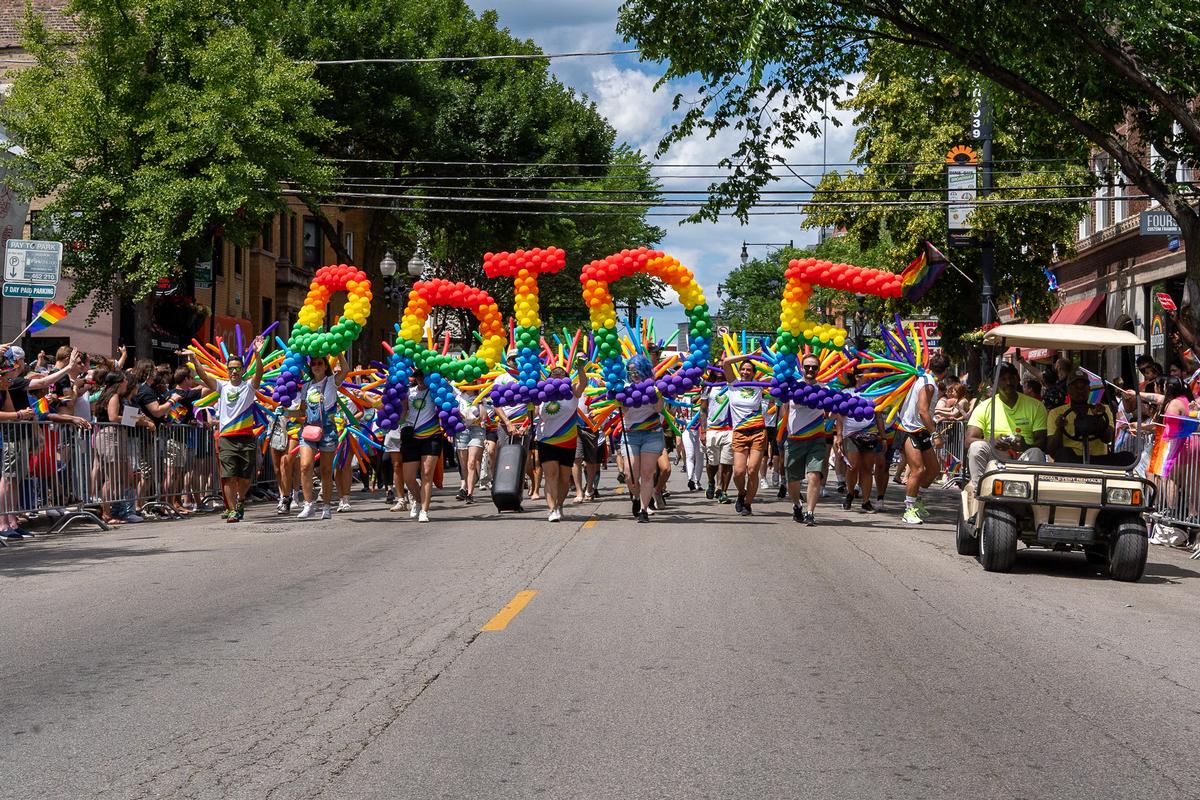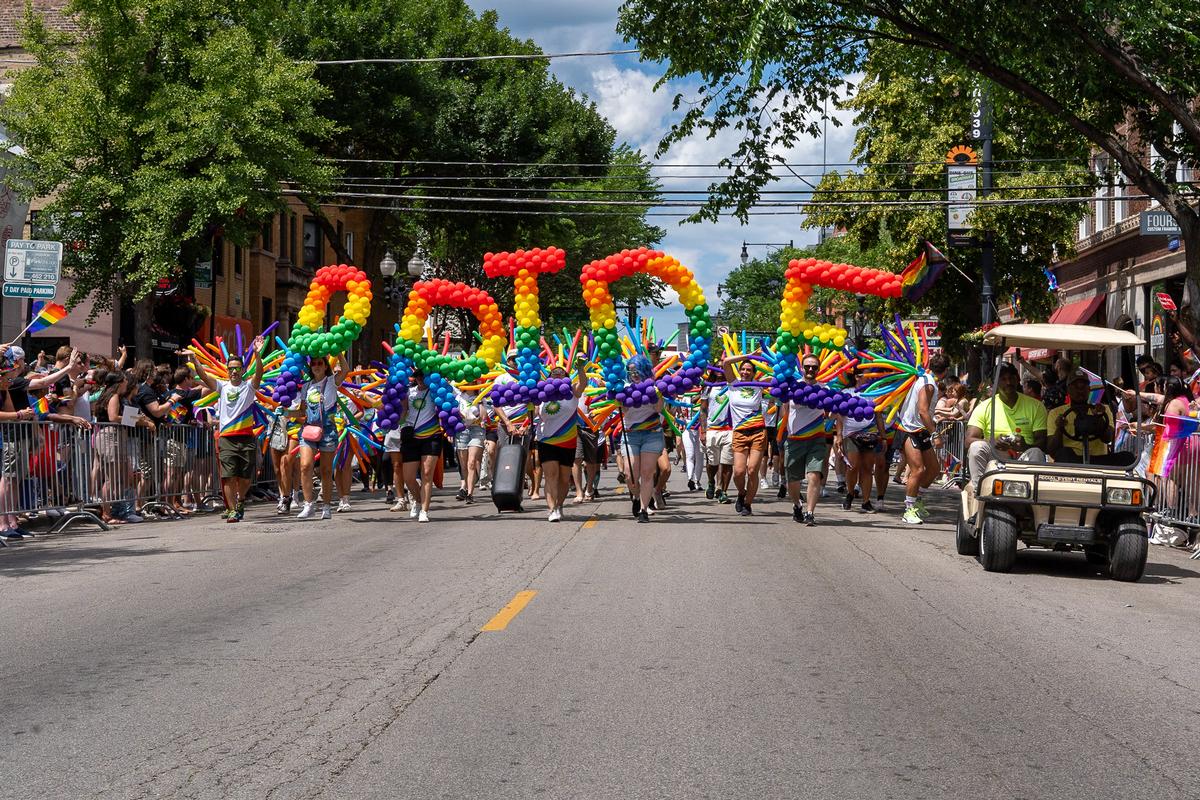Everything you need to know for the 2024 Chicago Pride Parade
Sat. June 29, 2024 6:38 AM by GoPride.com News Staff

2024 chicago pride parade
photo credit // gopride.com
The 53rd annual Chicago Pride Parade steps off at 11 a.m. on Sunday, June 30
Inspired by the revolutionary events of Stonewall in New York City a year earlier, the first Gay Liberation March was held on Saturday, June 27, 1970, making Chicago the first city to hold such a march, followed by New York City and San Francisco on Sunday, June 28, 1970.
Although it started as a modest, yet purposeful march of 100 – 150 people from Washington Square Park called Bughouse Square to the Water Tower, ultimately reaching the Civic Center (now called Daley Center), it was a defining moment for the LGBTQ+ community of Chicago and the World.
From its modest beginnings, the annual Chicago Pride Parade has grown in visibility and popularity. Since 2013, the Parade has consistently attracted over one million attendees each year, making it not only the oldest, but also one of the largest Pride parades worldwide.
The Chicago Pride Parade, the culmination of Pride Month, returns Sunday, June 30 at 11 a.m.
Planning to attend the Chicago Pride Parade? Here's everything you need to know.
ROUTE AND TIME: The parade starts at 11 a.m. at the corner of Broadway and Sheridan, a few blocks south of the 2023 start. The parade featuring 150 colorful entries will then travel the 2-mile parade route south on Broadway; then south on Halsted; then east on Belmont; then south on Broadway; then east on Diversey to Cannon Drive.
There will be five pedestrian crossover streets along the parade route: Addison at Halsted, Cornelia at Halsted, Buckingham at Halsted, Briar at Broadway and Wellington at Broadway,
BEST VIEWING: The Belmont and Addison stations (and the surrounding area) tend to become the most crowded, so you are encouraged to consider watching the parade from the other parts of the route, including along Broadway, south of Belmont. The Diversey station is toward the end of the route and would be a good option. The Sheridan station at the beginning of the route is another option, though its not ADA Accessible.
GRAND MARSHAL: Comedian, writer, and actor Fortune Feimster and her wife, Jax Smith, will be leading the procession. The couple’s love story began at Chicago Pride in 2015, just days after the Supreme Court’s historic ruling for nationwide marriage equality. Since then, they have shared a journey of love and commitment, culminating in their marriage in October 2020.
Fortune and Jax will be joined by two other loving couples as COMMUNITY GRAND MARSHALS.
Chicago activist and bar owner Art Johnston and his partner in life and business, José Pepe Peña. The couple, who have been together for 50 years, helped create community – opening the iconic gay bar Sidetrack in 1982 – and fueled a civil rights movement that is still active today. Johnston was an important organizer in passage of Chicago and Cook County human rights legislation and was a co-founder of the Illinois Federation for Human Rights, now known as Equality Illinois. The duo, nationally recognized LGBTQ+ civil rights leaders, are also the subject of an award-winning feature documentary, ART AND PEP.
Longtime LGBTQ+ activists, community organizers and high-profile transgender couple Myles and Precious Brady-Davis. Myles Brady-Davis is communications director of Equality Illinois and Precious Brady-Davis recently became the first Black transgender person appointed to public office in Cook County as well as the first trans person to serve on a water reclamation board in U.S. history. Precious wrote the best-selling book, I Have Always Been Me. The couple married in 2016 and are now raising two beautiful children.
“These couples epitomize this year’s theme of ‘Pride is Power,’ not just through their own achievements, but through their unwavering support and commitment to advancing LGBTQ+ rights and visibility,” said Tim Frye, PRIDEChicago lead coordinator.
AND HIGHLIGHTS: Last year, Ferrara Candy Company handed out 2,500 pounds of candy. This year, they return along with the Chicago Gay Men’s Chorus marching along with a Sweetarts float. The float will be decked out in rainbows and the Sweetarts and GCMC logos.
Chicago Pride Guard will feature neon green flags, adorned to hot pink. At least 35 members are set to march with the group, all in spandex, with headbands and leg warmers. They will have a rad time as their theme is, naturally, The 80s. They will dance and perform to a classic 1980s song mashed up with a fun banger. Get ready for Love Shack Bang by the B-52s and Jessie J, Ariana Grande and Nicki Minaj.
And 125-members of the Lakeside Pride Ensembles will kick off the parade. Continuing with its current theme, Nature and songs about nature that relate to the LGBTQ+ community, such as: Flowers, from Miley Cyrus; Rain On Me from Lady Gaga and Ariana Grande; and Ain’t No Mountain High Enough from Marvin Gaye.
LESS ALCOHOL, MORE SECURITY: Security will be tight again this year. Open container rules will continue to be strictly enforced, with private security workers patrolling the parade and police on every corner. Penalties include, but are not limited to, $1000+ tickets being issued, and you could have to throw out your booze.
STREET CLOSURES: Street closures should start as early as 6 a.m. for staging areas: Sheridan from Sheffield to Lake Shore Drive, Broadway from Irving Park to Grace, Clarendon from Cuyler to Broadway and Fremont from Irving Park to Sheridan, with parade route closures beginning at 9:30 a.m. or as the crowd dictates for safety issues. Streets should reopen by 8 p.m., or when deemed safe to do so.
PARKING RESTRICTIONS: There are a number of parking restriction, please observe all temporary parking signs.
TRANSPORTATION: Public transportation is highly recommended. The CTA will be providing extra service and longer trains on the L, and several buses will be re-routed on parade day. Bicycles will not be permitted on CTA trains for most of the day, and strollers and carts must be folded before boarding all CTA buses and trains.
The nearest L stops are: Sheridan (not ADA accessible), Addison or Belmont on the Red Line and Southport, Belmont, Wellington, or Diversey on the Brown Line. Bus lines are 8, 22, 36, 80, or 152.
The CTA encourages riders to avoid the Belmont station, which will likely be crowded.
Metra will provide extra trains on the BNSF, UP North, UP Northwest and UP West Lines. Other lines that operate on Sundays will offer extra seating capacity.
PARKING: There won't be much street parking available near the assembly or parade routes, so if you're driving be prepared to park outside of the immediate area. Watch for temporary no parking signs.
WEATHER: Sunday's forecast calls for sunshine and a high in the 70's, according to the National Weather Service. The parade is rain or shine, pending any severe weather.
COOLING BUSES: The city will provide cooling buses located on Addison west of Halsted, Roscoe west of Halsted, Belmont east of Broadway, Wilton north of Belmont, Waveland between Broadway and Halsted, and Belmont westbound between Halsted and Clark.
EMERGENCY ASSISTANCE: If you need first aid, the Chicago Fire Department has first aid stations at Addison east of Halsted, Roscoe east of Halsted, Aldine east of Halsted, and Surf west of Broadway.
NEEDS AND SPECIAL NEEDS: Portable restrooms will be stationed along both the parade line-up street and the parade route. For seniors or those who need wheelchair-accessible sites, head near 600 W. Diversey. It's towards the end of the parade route and typically is less crowded than other streets. This area also has portable restrooms for those with special needs.
HISTORY: Pride Month and Pride parades commemorate the Stonewall rebellion that took place on June 28,1969, when patrons of a New York City gay bar, the Stonewall Inn, fought back during a raid by police. At that time, gay bars were frequently raided across the country. That night, patrons fought back and street demonstrations continued for several days. During that week, gay liberation groups were formed, thus giving birth to the modern-day LGBTQ rights movement.
Pride parades are staged in over 200 cities worldwide in more than 125 cities in the United States with at least 12 taking place on the last weekend in June every year. In recent years, many are staged in small towns across the country and recently in various suburbs of Chicago, including Buffalo Grove and Aurora, Illinois.
The annual Chicago Pride Parade has been coordinated by PRIDEChicago since 1974.






